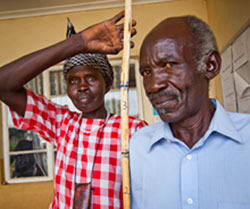The Mectizan Donation Program (MDP) celebrated 25 years of partnership and progress in an Oct. 17 roundtable program at The Carter Center, one of the program's partners in the fight against river blindness.

At a Mectizan drug donation site in Uganda, health center workers demonstrates how they measure residents to determine the correct does of medication. Kay Hinton/The Carter Center.
To commemorate the 25th anniversary, MDP brought Rollins School of Public Health Professor Emeritus William Foege and former Merck CEO Roy Vagelos together with former U.S. President and Carter Center founder Jimmy Carter to reflect on the early days of the program and comment on prospects for the future.
River blindness, or onchocerciasis, is a centuries-old parasitic disease that plagued remote communities in Africa, Latin America and Yemen. The disease is characterized by intense itching caused by the parasites in the skin and over time it also leads to visual impairment and ultimately, blindness. In the past, the only way to escape the disease was to desert fertile farmlands near fast-flowing rivers where the black flies that transmit the disease breed.
In the late 1970s, pharmaceutical company Merck & Co., Inc. began developing Mectizan, a drug that taken once annually would alleviate symptoms and control transmission of river blindness.
River blindness is "a terrible thing to watch," recalled Foege. Itching is "the first thing [people] know in the morning and the last thing they know at night," he said. "After people took Mectizan, some had the first itch-free day that they could ever remember."
When the drug received regulatory approval in October 1987, Merck CEO Roy Vagelos made the groundbreaking decision to donate Mectizan for the control of river blindness.
Merck's unprecedented decision
The populations afflicted by river blindness could not afford the drug. Vagelos recalled: "We offered to sell it to the government at cost…but they didn't have the money in the budget. We learned that the French regulatory [agency] was going to approve the drug in three days and we had no plan." He continued: "…this company had never failed to get the drug to people who needed it. So we as a company decided to [donate the drug]. We had a press conference in Washington…and we announced at that time that Merck would contribute the drug free to anyone in the world who needed it, for as long as it was needed."
The question then became how to get the drug to the people who need it. Merck sought Foege's expertise. At the time, Foege was executive director of two Emory affiliates, The Carter Center and the Task Force for Child Survival (now the Task Force for Global Health) where he established the Mectizan Donation Program and its advisory body the Mectizan Expert Committee.
Foege recalled a number of concerns whether a drug donation on such a large scale was feasible. Would the company really donate as much as needed? Was the drug safe? How would it get to the people who need it?
In the early days of the program, Foege and the Mectizan Expert Committee realized that the best way to treat as many people as possible with Mectizan was to engage ministries of health and nongovernmental organizations (NGOs). An annual application process was developed to ensure that the drug was distributed by partner NGOs and ministries of health with good medical practice, and the program was launched.
During the Oct. 17 celebration, Foege said, "the program worked better than anything we could have imagined."
Today, MDP is the longest-running, disease-specific drug donation program of its kind. MDP and Merck ship enough Mectizan annually to treat 140 million people in 35 countries. The results seen in affected communities have led the program and its partners to a shift from the original goal to control the disease to now working to eliminate river blindness worldwide.
Since absorbing the River Blindness Foundation in 1996, The Carter Center has been a pioneer in the international campaign against river blindness and is one of the MDP's biggest implementing partners.
Working toward elimination
"Twenty-five years after Merck's unprecedented donation of Mectizan, significant progress has been made to reduce the suffering caused by river blindness," said Carter. "In Africa, where it was once thought the disease could only be controlled, strides are being made to completely eliminate the disease from a number of countries. And in the Western Hemisphere, The Carter Center and its partners are close to eliminating river blindness. Thanks to Merck, the commitment of endemic communities, and strong partnerships, we can now envision a world someday free of river blindness."
The Carter Center's Onchocerciasis Elimination Program for the Americas (OPEA) is very close to eliminating transmission of the disease from its six endemic countries. In 2011, Colombia became the first country to submit a formal request to the World Health Organization to verify elimination.
The success of the donation of Mectizan led to other neglected tropical disease interventions. In 1998, Merck expanded its commitment to include Mectizan for the elimination of lymphatic filariasis in African countries and Yemen where lymphatic filariasis co-exists with river blindness. In these countries, Mectizan is co-administered with albendazole, a drug donated by GlaxoSmithKline. Albendazole is also donated along with mebendazole, donated by Johnson & Johnson, to treat intestinal parasites in children and Pfizer is donating Zithromax for the elimination of trachoma. The Task Force for Global Health is home to all three drug donation programs: MDP, Children Without Worms and the International Trachoma Initiative.

